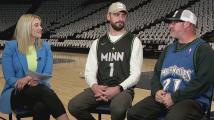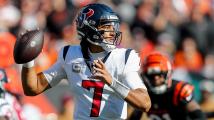Why managers need to stay flexible in fantasy drafts
In the Yahoo Fantasy Football Forecast, Andy Behrens and Scott Pianowski examine different approaches to fantasy drafts
Video Transcript
[CHEERING AND SPORTS SOUNDS]
SCOTT PIANOWSKI: If you haven't drafted yet this year, be prepared. You will feel-- you will be uncomfortable with your team and with your selections and like, man, I really don't know what to do, sooner than you've ever felt. It used to be like the-- it used to be like the fifth round was like, OK, I got to start picking guys I'm not in love with. And then that kind of became the fourth round. And that kind of became-- oh, look at the third round. You can talk down all of these guys.
Now I'm like, if you don't-- if you don't get a guy you're really excited about-- again, I just did an MFL where it's like, OK, I'm going to get Kupp, or Chase, or Jefferson. I didn't get any of those guys. And now what do I do? I actually took Austin Ekeler, which I'm fine with. And, you know, Liz told me it was a good pick, so. No problem with that.
But I very quickly got into unsettled ground. I didn't see a receiver I liked in the middle of the second round. I ended up with Nick Chubb. There's so many things about the Browns that [INAUDIBLE].
ANDY BEHRENS: We also-- we have all these branded draft philosophies now that, you know, conflict with each other, right, that you start thinking about very soon in a draft. Oh, should I-- maybe since I took Jefferson in the first round, I should be a zero RB team. And you'll start looking at the running backs in round 4, round 5. And you'll be like, oh, people have warned me against the dead zone RBs. I shouldn't pick one of these guys, right? Like, you just-- there's too many-- there's too many conflicting sensible draft philosophies. It is--
SCOTT PIANOWSKI: You know what? I--
ANDY BEHRENS: Go ahead.
SCOTT PIANOWSKI: It's funny you say that because I think it's important to-- you're not the drive-through at McDonald's. You don't have to pick, like, a value meal, right? I mean, your draft doesn't have to be like, I'm going to take a number three. OK, I'm going to take a number five, you know, with a-- sub in-- sub in this for that, you know. It's OK to do-- have an a la carte draft that doesn't have a three-word packaging, or branding, or--
ANDY BEHRENS: Yes.
SCOTT PIANOWSKI: --attachment to it, OK? And that's one reason why I love these best ball drafts so much. You know, I'm on a best ball draft. There's a four-hour clock with it. So I can sit and thoughtfully think about what I want to do and look at the shape of the draft to this point, try to envision, you know, who's picking behind me, what are they likely to do, what are their roster needs at this point.
And I'm not looking to-- and not every analyst is like this. I think a lot of people go into these things, and they say, OK, well how am I going to draft in a way I can write about it, or I can sell it, or I can market it, or I can package it, or I can make a sound bite out of it? It's OK to draft a la carte, you know?
And that doesn't mean I don't have thoughtfulness to all my picks. But it's not like, OK, well, I've gone in with this strat-- this hard-- or let's say you decided you wanted to go whatever it was, robust RB, zero RB, you know, early-round quarterback, tight-- robust tight end. You still have to-- say you think, OK, I'm going to dominate my league because I want to get the best tight end. I want like Kelce or Andrews at the turn.
And then for whatever reason, your room gave you Ja'Marr Chase. You know, I was in the Fantasy Football Index draft, where I picked the number six slot. Jefferson or Chase, I wanted one of those guys. I forget which one I took. I think I took Jefferson. And then Chase went like 10th or 11th and made me want to throw up. I'm like, jeez, if I had known I could have gotten one of those guys that late, I could have totally, you know, done my team differently.
So don't-- walk in with a plan of some sort. But it's gotta be in pencil, and try to take what the room gives you, and be ready to pivot to whatever opportunities are available because every draft's going to have some sort of quirk to it, some sort of nuance, or some sort of opportunity you didn't see coming because there's no way to know until the bullets are flying.
And also-- I say this all the time-- we do make rankings. We make them for magazines. We make them for the Yahoo website. We change them constantly. But you really don't know how you feel about a player pool until you're in a room, and the clock is ticking, and you have to make up--
ANDY BEHRENS: 100%.
SCOTT PIANOWSKI: --your mind on something. And that's when-- that's where the ranks really come from. You draft to tighten up your ranks. It's not like, oh, I'll tighten up my ranks, and then the drafting will just be going off my list. Doesn't work that way.
![Timberwolves lose to Nuggets: KAT reacts [RAW]](https://s.yimg.com/uu/api/res/1.2/DDo9vIomufyDg2tbS4b.Tw--~B/Zmk9c3RyaW07aD0xMjA7dz0yMTQ7YXBwaWQ9eXRhY2h5b24-/https://media.zenfs.com/en/kmsp_fox_local_videos_345/e76a0955bbad1e43d6ae7319eea8e774)





